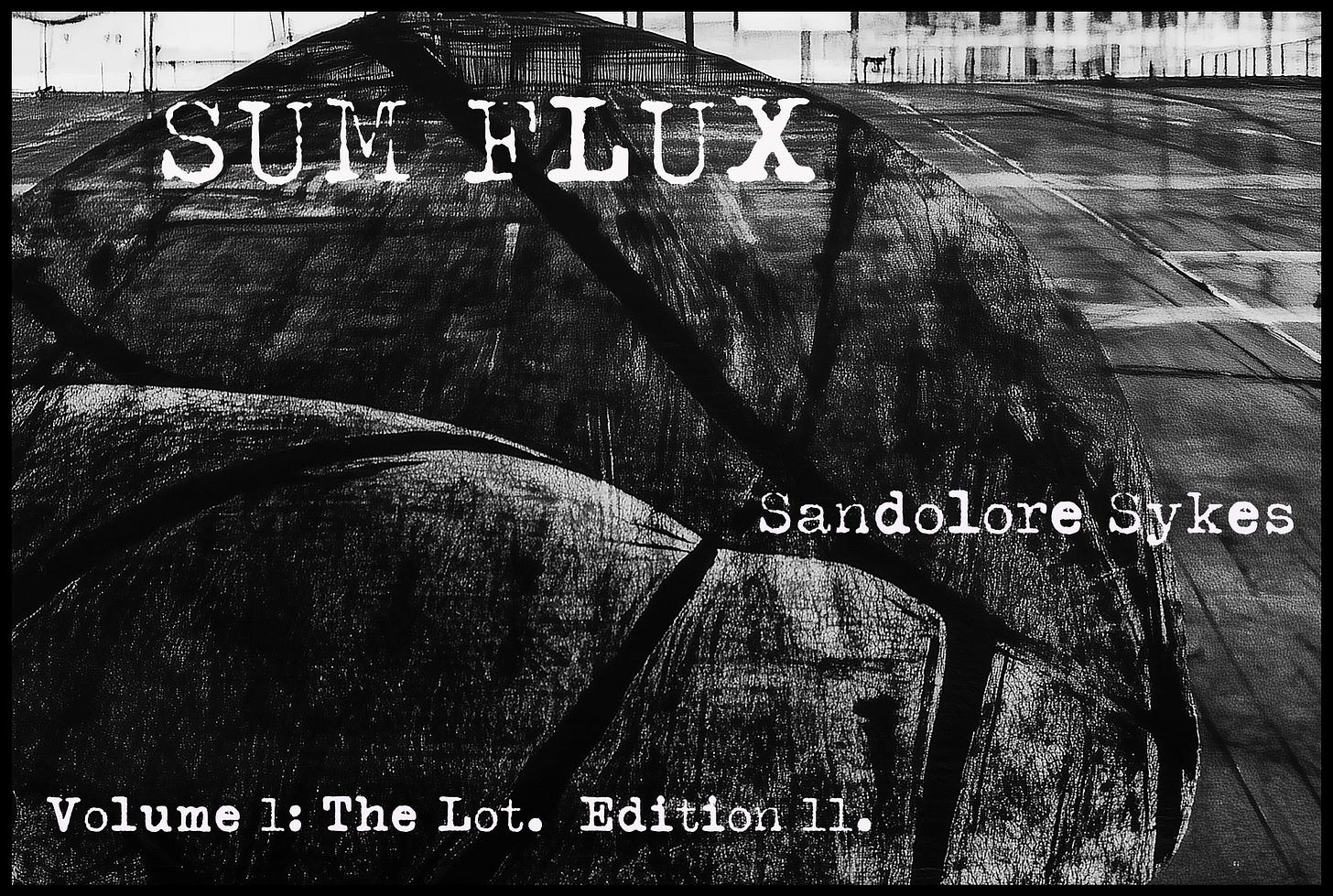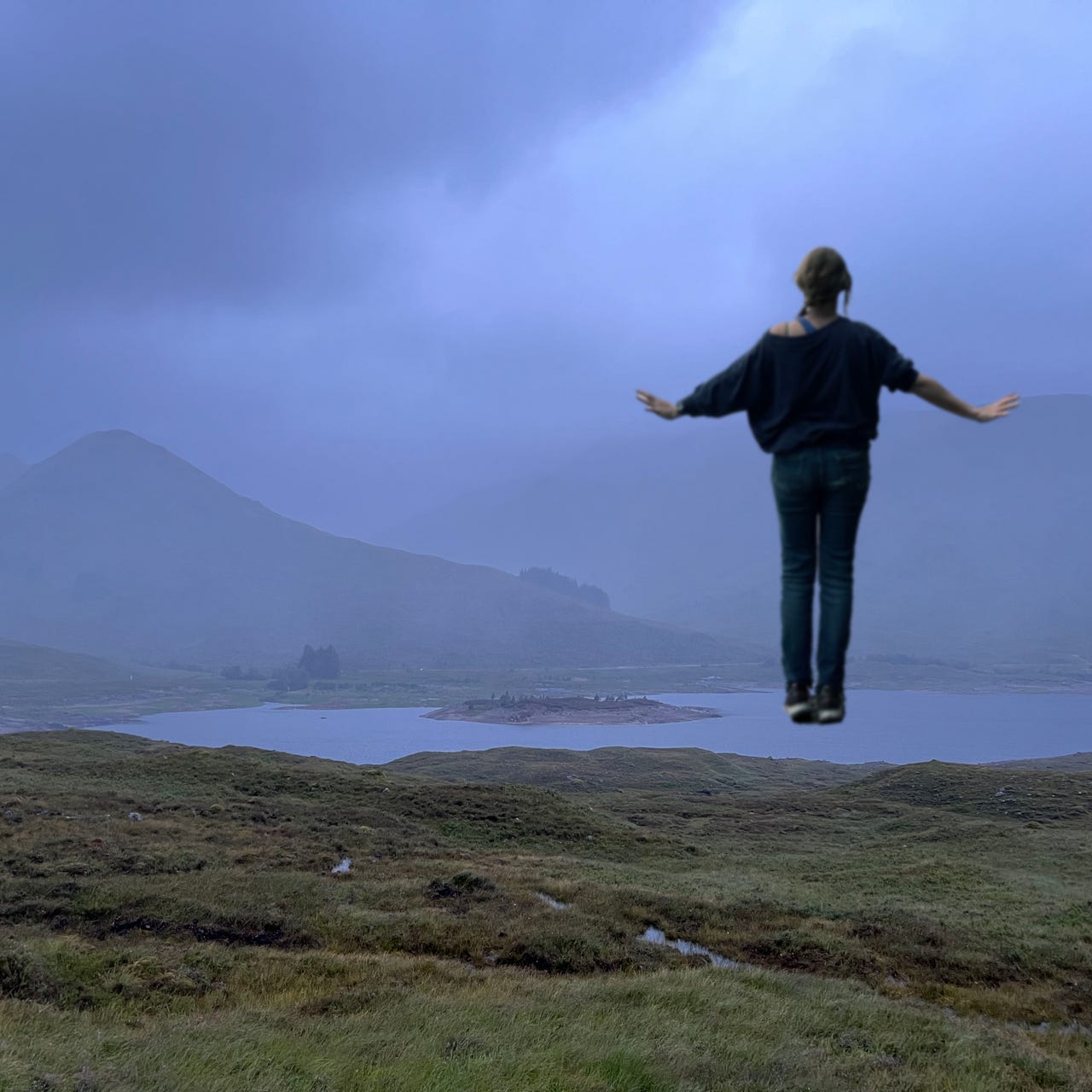This piece is part of The Lot, the first volume of SUM FLUX. Featured in Edition II, this work is one of eight contributions to this edition. Read more about this zine and its theme here: https://sumflux.substack.com/p/volume-1-the-lot.
Richard comes here, even when he doesn’t have an appointment. This parking lot, nestled behind the stone wall in the high trees, feels like it’s his alone. He reclines, pushes the button that whirs and glides his seat away from the steering wheel, the motion like the first click of a roller coaster, a kind of promise of weightlessness.
The lot is secluded, tucked behind the stone wall covered with benign graffiti that reads, 'Hello!' in violet bubble letters, scrawled like a welcome message. After work, this is where he goes, waiting for the sunset to make everything go golden.
He puts on his playlist, lays back and watches the movement of the leaves against the sky. The days are getting shorter, and he has to leave work earlier each night to get there before the sun sets. Beyond the sounds of bouncing basketballs, skateboard wheels, and the padded feet of runners, he hears the river.
At first, he came here for the meetings. Then, he started coming just to put off going home. Now, there’s another pull—separate from the others, sharper somehow—like he’s had a taste of something, a single bite of freedom. Or maybe not freedom. Freedom snaps like a flag in the wind, too loud, too self-congratulatory. No, this is quieter—more like being able to breathe again.
He thinks, I need a word for this. Not to share it—just to hold it, to name it. He wasn’t much of a talker; he never had been. At work, they teased him for his clipped answers and silences. Tony teased him too, mistaking his quietness for timidity, even though they’d known each other since the third grade.
It bothered him that Tony had never figured out the difference. Quiet wasn’t necessarily shy. But Tony, impatient as ever, would barrel through Richard’s careful pauses, finishing his sentences as if silence needed rescuing.
Despite their shared history, he didn’t really consider Tony a friend. He only tolerated their two or three dinners a year because Tracy had struck up something resembling a friendship with Tony’s wife, becoming yoga partners, and occasional confidantes. Maybe they even commiserated over being childless. After all, they were all in their forties now, and the possibility of children felt like sunlight slipping on the horizon—there, then gone, leaving only a shadow.
Tony loved to call him 'The Pooeeett!'—dragging out the word in a theatrical drawl. It grated on Richard, especially when Tony mocked him for being 'the Wordless Poet.'
Tracy had even joined in once, laughing as she described the time she’d thrown away a chapter of his novel, soaked in coffee. She told the story like a joke, exaggerating how red-faced and furiously inarticulate Richard had been. “It was an accident!”
But Richard remembered the time – not so long ago – before the destroyed chapter. She crossed her arms across her chest as he announced he was considering taking up writing again. He remembered her stone face and how she’d walked away saying, “I don’t care what you do as long as we can pay the mortgage.”
As a boy, he’d written poems, filling notebooks alongside sketches of basketball players. Back then, his basketball skills offset the teasing his poetry created. Tracy had fallen for him watching him play, calling him a gazelle. She’d said it once, leaning against the bleachers, her blond hair in a messy bun, and he’d written her a poem for it.
But the poems never paid the rent. It was Tracy who convinced him to take the job. At her job as a dental hygienist, a client had suggested Richard contact him about a clerk position at his insurance company, as he glanced at Tracy’s worn shoes. It was only meant to be temporary . . . but the years passed. She’d said she wanted kids, never asking outright – but he’d known. He’d put it off for years, saying it wasn’t the right time, until their lovemaking simply stopped. She had given up.
Some days, he parks with the sun at his back to have a view of the buzzing activity of the plaza. Other days, he faces the overgrown wall, its vines catching the last light of day. Dust hangs in the air, lit by a soft glow, as he listens—really listens—to the music: 'I keep my visions to myself…'
At work, he finds himself distracted, planning his evenings in the lot. Where will he park—facing the sun, or with it at his back? Would it rain? Should he park where the rain will pound hard on the roof, or seek the shelter of the trees? Under the streetlight, to watch its halo, or in the darkness, with only the glow of his blue stereo lights? He works through lunches now, rushing to finish his graphs and charts so he can leave early, not missing the sunset. Each night, he lingers longer—leaving work earlier and driving home even later from the lot.
He told Tracy that he was competing for a promotion, so he’d need to stay late every night. She accepted this unquestioningly, disinterested. He’d said it offhand, as they stood at the marble island in their kitchen, elbows resting on the counter, her eyes fixed on her phone. She gave a brief look of fatigue, a cloud that passed over her face. To Richard, it seemed like the sheer sound of his voice exhausted her.
They hardly ever talked now. They ate their dinners in front of the TV, and if they had something to say, it was just logistics. Perhaps his absences were a relief to her as well. Maybe she wouldn’t even care if she knew.
He wonders…when was the last time he took her full lower lip between his lips? He blinks it out of focus. It seems absurd to him now. He imagines slipping his hand up her blue negligee, imagining his hand moving across the white skin of her bare thigh. But she doesn’t wear things like that anymore.
When the woman comes, he always faces the sun. It is more private this way, parked toward the wall, with the dust in the air lighting up. He leans back, not needing to speak, and lets the world, and himself, explode into total ease and release.
Tony had passed him the number, torn off from his wife’s spiral notebook. Richard had kept the number in his pocket, where it became crumpled and damp from his nervous hands, constantly sliding in to touch its uneven edges. Sometimes he’d panicked, plunging his hand desperately into his pocket, feeling a wave of relief when it was still there. Eventually, he put it into his phone under “Golden Lion Automotive,” until one day, sitting in the lot, he found the courage to press “call.”
Tony always had a scheme, something new to push Richard into. He liked to get right up in his face, speckles of spittle landing on Richard’s skin. Sometimes Richard discreetly wiped it away; other times, he just let the droplets sit there. Tony had told him how discreet the operation was, how pretty the girls were, how clean everything was. "If they’re going to withhold, we’ve got to get it somewhere—or we’ll implode," Tony had said.
Maybe that was the image, the implosion, that made Richard know he was, eventually, going to make that call. Maybe that, and the sudden sad look on Tony’s face—the way his shoulders slumped, how he suddenly looked older, faded.
Implode, not explode. Exploding would be honest—a violent rebellion, the body turning inside out, blood and guts. Implode, Richard thought, a thing reducing in on itself, losing shape. He imagined a basketball. The pffff of the air inside sighing out, the skin going wrinkly. Its form caving in on itself, until it was just a leather rag.[8]
She’d first come on a Wednesday, and as he’d leaned back, her blond curls had lit up, an insane golden cloud, a halo sketching each strand. She had been kind to him, and they didn’t need to talk. It was simple. But it wasn’t just the release—sometimes, before opening the car door, she would touch his face, her hands warm and soft, smelling like apples, to feel, just for one second, the warmth of being touched, almost like being seen.
In the beginning, Tracy left plates on the counter for him, covered with aluminum foil. But lately, he came home to a silent, dark house, and Tracy already asleep. No plate waited for him. It didn’t feel accusatory; he was fading, so gradually and quietly that it was almost as if she didn’t even notice.
***
He was staying longer now, long past the sunset, which was getting earlier every night. He stayed to watch the day fade, listening to his music. The night brought a different kind of deep privacy. A black journal now sat open on the passenger seat, where Richard had begun writing—words, snippets of phrases that felt like the beginnings of something.
When the streetlights flashed on, the eerie, surreal light lit up the branches of trees. Some nights, the stadium lights came on, making the whole lot look like a movie set. Each object and shadow was so drawn and intentional. ***He writes the things he sees down.
As time goes by, he stays later into the night, the sun sets nearly as soon as he parks his car, and he falls asleep, lulled by the sound of the river, entranced by the music and the fog around the streetlights. At first it was only once in a while, but little by little he begins sleeping there – every night – waking in the early dawn to go home, shower, and change before heading to work, dreaming of his evenings in the lot.
One night, asleep in a rainstorm, the winds buffeting his car, he dreamed he was in a boat on a sea filled with rafts and debris. Houses floated past, their kitchens full of families at dinner tables. He could see into a basketball court with kids, their shoes squeaking on the shiny floor.
Pages torn out of books floated around him—empty pages, pages covered in scribbles. The sea churned with words. Reflected in the water, the violet graffiti undulated like sunlight on waves. Watching it move, he felt an indescribable joy, as if it were speaking directly to him: “Hello, hello, hello, hello…”




Just gorgeous. And sad. And strangely joyful, too.
This is such an incredible piece… so many insanely good quotes I wanna repost